 Jasse considers how the various European colonial projects shared the similar aim, for which they competed, of access to all sorts of resources for the economic benefit of their elites – a reality that, now being propelled under new globalized guises by new (alongside the same old) agents of so-called progress and development, is far from over.
Jasse considers how the various European colonial projects shared the similar aim, for which they competed, of access to all sorts of resources for the economic benefit of their elites – a reality that, now being propelled under new globalized guises by new (alongside the same old) agents of so-called progress and development, is far from over.
I'll visit
25.03.2025 | by Ana Balona de Oliveira
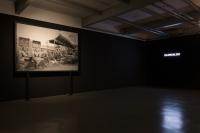 “The Mechanics of the Ephemeral” stems from the idea that art as a mechanism allows us to travel to different temporal spaces by adopting an approach that often resorts to fantasy, but in which the imagination becomes an important ally in historical and socio-political questioning. Although the discourses of the invited artists vary in their approaches and navigation of this temporal and identity- forming flow, the common denominator is their relationship with a continent inhabited by the dreams and follies of foreign ghosts. There is also an urgent need to address a future still based on meaningless promises of progress and freedom – a situation which is not exclusive to the African continent – to equally embrace the influences of the various artistic languages and references that comprise this joint work and overflow national borders and continental platforms.
“The Mechanics of the Ephemeral” stems from the idea that art as a mechanism allows us to travel to different temporal spaces by adopting an approach that often resorts to fantasy, but in which the imagination becomes an important ally in historical and socio-political questioning. Although the discourses of the invited artists vary in their approaches and navigation of this temporal and identity- forming flow, the common denominator is their relationship with a continent inhabited by the dreams and follies of foreign ghosts. There is also an urgent need to address a future still based on meaningless promises of progress and freedom – a situation which is not exclusive to the African continent – to equally embrace the influences of the various artistic languages and references that comprise this joint work and overflow national borders and continental platforms.
I'll visit
21.12.2021 | by Gisela Casimiro
 In the contemporary discussions regarding post-colonial Europe, the concepts of memory and post- memory have taken on growing importance, giving prominence to an insight with great political relevance: colonialism never ends with those who enforced or suffered it. Traces of a colonial mindset impregnate generations to come and it has been passed down through the image of the former coloniser and the former colonised. These characters restage a complex phantasmagoria closely related to the most intimate ghost of the European subconscious: its colonial ghost which manifests itself inter alia in the form of a colonial “transfer of memory” – as racism, segregation, exclusion, subalternity – or in the form of “eruptions of memory”, and thereby questions the very essence of European multicultural societies, shaped by colonial heritage and fed by waves of migration.
In the contemporary discussions regarding post-colonial Europe, the concepts of memory and post- memory have taken on growing importance, giving prominence to an insight with great political relevance: colonialism never ends with those who enforced or suffered it. Traces of a colonial mindset impregnate generations to come and it has been passed down through the image of the former coloniser and the former colonised. These characters restage a complex phantasmagoria closely related to the most intimate ghost of the European subconscious: its colonial ghost which manifests itself inter alia in the form of a colonial “transfer of memory” – as racism, segregation, exclusion, subalternity – or in the form of “eruptions of memory”, and thereby questions the very essence of European multicultural societies, shaped by colonial heritage and fed by waves of migration.
To read
31.10.2021 | by Margarida Calafate Ribeiro
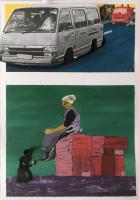 The article by Achille, I think, significantly points out the legitimacy of being limited from obtaining oxygen, by explicitly pointing out that for some parts of the world where healthcare is part of organized neglect, we are faced with more than just the need to physically breathe. There is a prohibition of breathing that is systemic in nature which is part of a larger need for the freedom to breathe (live). For example the violent killings of black civilians by the police in South Africa due to an unchecked implementation of COVID-19 laws and regulations left us questioning the relevance (need) for policing systems embedded in colonial rhetoric.
The article by Achille, I think, significantly points out the legitimacy of being limited from obtaining oxygen, by explicitly pointing out that for some parts of the world where healthcare is part of organized neglect, we are faced with more than just the need to physically breathe. There is a prohibition of breathing that is systemic in nature which is part of a larger need for the freedom to breathe (live). For example the violent killings of black civilians by the police in South Africa due to an unchecked implementation of COVID-19 laws and regulations left us questioning the relevance (need) for policing systems embedded in colonial rhetoric.
Face to face
08.04.2021 | by Marcos Jinguba
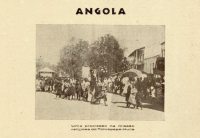 References to Portugal’s epic, seafaring past like these litter this city – there is even a Vasco da Gama shopping mall. But until now, there has never been a single explicit reference, memorial or monument in Portugal’s public space to its pioneering role in the transatlantic slave trade, nor any acknowledgement of the millions of lives that were stolen between the 15th and 19th centuries.
References to Portugal’s epic, seafaring past like these litter this city – there is even a Vasco da Gama shopping mall. But until now, there has never been a single explicit reference, memorial or monument in Portugal’s public space to its pioneering role in the transatlantic slave trade, nor any acknowledgement of the millions of lives that were stolen between the 15th and 19th centuries.
Games Without Borders
15.03.2021 | by Ana Naomi de Sousa
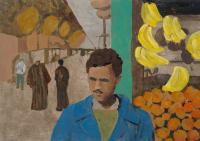 It’s a common place to say that the memory production drags with it, inevitably and concomitantly, the forgetfulness production. There are many ways of forgetfulness, the most insidious of which is, undoubtedly, the memory erasure, the past rewriting as part of a deliberated strategy of intervention in the present.
It’s a common place to say that the memory production drags with it, inevitably and concomitantly, the forgetfulness production. There are many ways of forgetfulness, the most insidious of which is, undoubtedly, the memory erasure, the past rewriting as part of a deliberated strategy of intervention in the present.
Games Without Borders
13.03.2021 | by António Sousa Ribeiro
 It is February 1964—one year into the armed struggle for independence in Guinea Bissau against Portuguese colonial rule. Cabral, the independence struggle’s leader, had called a conference in Cassaca for his African Party for the Independence of Guinea and Cape Verde (PAIGC) fighters to re-organize and address inter-party grievances.
The Cabral as seen in this and similar photographs, with his defiant stance, dark glasses, and signature knitted stocking cap in spite of the West African heat, would become the iconic image of the West African country. More than fifty years later, the image is still used to signify both Guinea Bissau’s victory in the 11-year independence struggle and the country’s continued hopes for the future. But what about the faces of the young women surrounding the independence hero? Directly to Cabral’s left in the image stands a round-faced, then 14-year old girl, Joana Gomes.
It is February 1964—one year into the armed struggle for independence in Guinea Bissau against Portuguese colonial rule. Cabral, the independence struggle’s leader, had called a conference in Cassaca for his African Party for the Independence of Guinea and Cape Verde (PAIGC) fighters to re-organize and address inter-party grievances.
The Cabral as seen in this and similar photographs, with his defiant stance, dark glasses, and signature knitted stocking cap in spite of the West African heat, would become the iconic image of the West African country. More than fifty years later, the image is still used to signify both Guinea Bissau’s victory in the 11-year independence struggle and the country’s continued hopes for the future. But what about the faces of the young women surrounding the independence hero? Directly to Cabral’s left in the image stands a round-faced, then 14-year old girl, Joana Gomes.
Games Without Borders
04.02.2021 | by Ricci Shryock
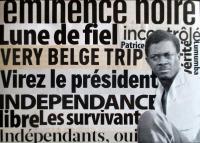 On June 30, 1960, at the ceremony for the proclamation of independence of the Congo, there were three speeches: from King Baudouin of Belgium, the former colonizing power, the President of the Congo, Joseph Kasavubu, and Patrice Lumumba, Prime Minister, the latter in an intervention not foreseen in the initial protocol. It was a short speech of about twelve minutes, written in an accessible and incisive language, performative and visual, a speech that, as the historian Jean Omasombo Tshonda defends, "founds the independent Congo". The first eight minutes are the clearest definition of what colonialism is from the point of view of a continent, a country, a community, a person.
On June 30, 1960, at the ceremony for the proclamation of independence of the Congo, there were three speeches: from King Baudouin of Belgium, the former colonizing power, the President of the Congo, Joseph Kasavubu, and Patrice Lumumba, Prime Minister, the latter in an intervention not foreseen in the initial protocol. It was a short speech of about twelve minutes, written in an accessible and incisive language, performative and visual, a speech that, as the historian Jean Omasombo Tshonda defends, "founds the independent Congo". The first eight minutes are the clearest definition of what colonialism is from the point of view of a continent, a country, a community, a person.
To read
01.02.2021 | by Margarida Calafate Ribeiro
 My own difficult experience teaching literature bears this out. Students’ response to every African story is that “the white man stole our culture, we are ashamed of our identity and need to return to our cultures”. But even as they limit colonialism to an exclusively cultural enterprise, they are not able to connect with stories of the past to which they say we should return to.
My own difficult experience teaching literature bears this out. Students’ response to every African story is that “the white man stole our culture, we are ashamed of our identity and need to return to our cultures”. But even as they limit colonialism to an exclusively cultural enterprise, they are not able to connect with stories of the past to which they say we should return to.
To read
22.12.2020 | by Wandia Njoya
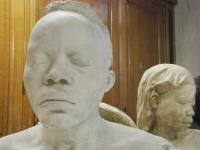 One of the other ways in which you see coloniality reemerge, is precisely in the mission the museum ascribes itself. "Africa" is an object of study while the idea of representativeness and the desire to be a window on a continent are the basic epistemological principles of imperialist logic. The scenography continues the "chosification" and "domestication"
One of the other ways in which you see coloniality reemerge, is precisely in the mission the museum ascribes itself. "Africa" is an object of study while the idea of representativeness and the desire to be a window on a continent are the basic epistemological principles of imperialist logic. The scenography continues the "chosification" and "domestication"
Afroscreen
23.10.2019 | by Marta Lança
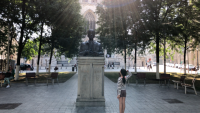 Eurocentric power needs to create narratives about colonial history in order to control interpretations of it. Concepts of law and justice have played an important role in this. Also today, the idea of justice is used to approve violent migratory control policies, including the aggressive persecution, detention, and deportation of persons.
Eurocentric power needs to create narratives about colonial history in order to control interpretations of it. Concepts of law and justice have played an important role in this. Also today, the idea of justice is used to approve violent migratory control policies, including the aggressive persecution, detention, and deportation of persons.
To read
22.06.2019 | by vários
 Why does Europe (still) have such trouble showing a coherent attitude in the face of discourses which legitimate racism and xenophobia? What are the masks that stop it from accepting its colonial past and understanding, once and for all, that diasporas are part of the richness of the European cultural map?
Why does Europe (still) have such trouble showing a coherent attitude in the face of discourses which legitimate racism and xenophobia? What are the masks that stop it from accepting its colonial past and understanding, once and for all, that diasporas are part of the richness of the European cultural map?
To read
22.06.2019 | by Felipe Cammaert
 By systematically deconstructing the travel logs and journals of European explorers, scientists and traders who wandered through tropical Africa in the late 19th century, proves that these documents were often idealized or inaccurate and that, most of the time, these Europeans were in a permanent state of ecstasy caused by the disease, high doses of quinine, alcohol, opiates and other drugs.
By systematically deconstructing the travel logs and journals of European explorers, scientists and traders who wandered through tropical Africa in the late 19th century, proves that these documents were often idealized or inaccurate and that, most of the time, these Europeans were in a permanent state of ecstasy caused by the disease, high doses of quinine, alcohol, opiates and other drugs.
Afroscreen
14.03.2016 | by António Pinto Ribeiro
 The work of Gilberto Freyre demonstrates his singular conception of time, merging past, present and future. Such conception shows us the ambiguities and contradictions when he speaks of the luso-tropical community. At times, he presents it as a past reality, dated from the 15th and 16th centuries, other times as a living, present reality, and other times even as future, destiny, idealization. It is mainly as a project that the idea of a luso-tropical community survived its author after the Portuguese empire ended. And it continues to this day in the Community of Portuguese Language Countries and in the more consensual political and ideological discourse about Portugal’s position in the world.
The work of Gilberto Freyre demonstrates his singular conception of time, merging past, present and future. Such conception shows us the ambiguities and contradictions when he speaks of the luso-tropical community. At times, he presents it as a past reality, dated from the 15th and 16th centuries, other times as a living, present reality, and other times even as future, destiny, idealization. It is mainly as a project that the idea of a luso-tropical community survived its author after the Portuguese empire ended. And it continues to this day in the Community of Portuguese Language Countries and in the more consensual political and ideological discourse about Portugal’s position in the world.
To read
28.05.2015 | by Cláudia Castelo
 ECAScreening6: A pair of Portuguese-language films quietly examine the standoff between old Europe and modern multiculturalism. Tabu was "Paradise Lost"; set in a forlorn, present-day Lisbon in which a middle-aged Christian, Pilar, takes a neighbourly interest in the affairs of Aurora, an elderly gambling addict who indulges in mild racism towards her Cape Verdean housekeeper, Santa. When Aurora dies, and Pilar tracks down the woman's former lover, the film's buttoned-up realism blossoms into "Paradise", a stylised account of the couple's days in Portuguese Africa. The affair is conducted against a stylised backdrop that is like a cinematic stampede of past-colonial fantasies and attitudes, from FW Murnau to Tarzan escapades, to the quirk-filtered nostalgia of Wes Anderson.
ECAScreening6: A pair of Portuguese-language films quietly examine the standoff between old Europe and modern multiculturalism. Tabu was "Paradise Lost"; set in a forlorn, present-day Lisbon in which a middle-aged Christian, Pilar, takes a neighbourly interest in the affairs of Aurora, an elderly gambling addict who indulges in mild racism towards her Cape Verdean housekeeper, Santa. When Aurora dies, and Pilar tracks down the woman's former lover, the film's buttoned-up realism blossoms into "Paradise", a stylised account of the couple's days in Portuguese Africa. The affair is conducted against a stylised backdrop that is like a cinematic stampede of past-colonial fantasies and attitudes, from FW Murnau to Tarzan escapades, to the quirk-filtered nostalgia of Wes Anderson.
Afroscreen
16.06.2013 | by Phil Hoad
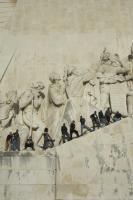 Lusosphere has a long way to go to become more interesting. If considered from the Portuguese standpoint, lusosphere reverberates the colonial past, people relate to and interest in the stories of each other more forcefully within the boundary of this "imagined community" that, despite this name, does not help them in living conditions and, if a Lusophone project exists, in most respects it has failed miserably.
Lusosphere has a long way to go to become more interesting. If considered from the Portuguese standpoint, lusosphere reverberates the colonial past, people relate to and interest in the stories of each other more forcefully within the boundary of this "imagined community" that, despite this name, does not help them in living conditions and, if a Lusophone project exists, in most respects it has failed miserably.
Games Without Borders
03.10.2011 | by Marta Lança
 Jasse considers how the various European colonial projects shared the similar aim, for which they competed, of access to all sorts of resources for the economic benefit of their elites – a reality that, now being propelled under new globalized guises by new (alongside the same old) agents of so-called progress and development, is far from over.
Jasse considers how the various European colonial projects shared the similar aim, for which they competed, of access to all sorts of resources for the economic benefit of their elites – a reality that, now being propelled under new globalized guises by new (alongside the same old) agents of so-called progress and development, is far from over.  “The Mechanics of the Ephemeral” stems from the idea that art as a mechanism allows us to travel to different temporal spaces by adopting an approach that often resorts to fantasy, but in which the imagination becomes an important ally in historical and socio-political questioning. Although the discourses of the invited artists vary in their approaches and navigation of this temporal and identity- forming flow, the common denominator is their relationship with a continent inhabited by the dreams and follies of foreign ghosts. There is also an urgent need to address a future still based on meaningless promises of progress and freedom – a situation which is not exclusive to the African continent – to equally embrace the influences of the various artistic languages and references that comprise this joint work and overflow national borders and continental platforms.
“The Mechanics of the Ephemeral” stems from the idea that art as a mechanism allows us to travel to different temporal spaces by adopting an approach that often resorts to fantasy, but in which the imagination becomes an important ally in historical and socio-political questioning. Although the discourses of the invited artists vary in their approaches and navigation of this temporal and identity- forming flow, the common denominator is their relationship with a continent inhabited by the dreams and follies of foreign ghosts. There is also an urgent need to address a future still based on meaningless promises of progress and freedom – a situation which is not exclusive to the African continent – to equally embrace the influences of the various artistic languages and references that comprise this joint work and overflow national borders and continental platforms.  In the contemporary discussions regarding post-colonial Europe, the concepts of memory and post- memory have taken on growing importance, giving prominence to an insight with great political relevance: colonialism never ends with those who enforced or suffered it. Traces of a colonial mindset impregnate generations to come and it has been passed down through the image of the former coloniser and the former colonised. These characters restage a complex phantasmagoria closely related to the most intimate ghost of the European subconscious: its colonial ghost which manifests itself inter alia in the form of a colonial “transfer of memory” – as racism, segregation, exclusion, subalternity – or in the form of “eruptions of memory”, and thereby questions the very essence of European multicultural societies, shaped by colonial heritage and fed by waves of migration.
In the contemporary discussions regarding post-colonial Europe, the concepts of memory and post- memory have taken on growing importance, giving prominence to an insight with great political relevance: colonialism never ends with those who enforced or suffered it. Traces of a colonial mindset impregnate generations to come and it has been passed down through the image of the former coloniser and the former colonised. These characters restage a complex phantasmagoria closely related to the most intimate ghost of the European subconscious: its colonial ghost which manifests itself inter alia in the form of a colonial “transfer of memory” – as racism, segregation, exclusion, subalternity – or in the form of “eruptions of memory”, and thereby questions the very essence of European multicultural societies, shaped by colonial heritage and fed by waves of migration.  The article by Achille, I think, significantly points out the legitimacy of being limited from obtaining oxygen, by explicitly pointing out that for some parts of the world where healthcare is part of organized neglect, we are faced with more than just the need to physically breathe. There is a prohibition of breathing that is systemic in nature which is part of a larger need for the freedom to breathe (live). For example the violent killings of black civilians by the police in South Africa due to an unchecked implementation of COVID-19 laws and regulations left us questioning the relevance (need) for policing systems embedded in colonial rhetoric.
The article by Achille, I think, significantly points out the legitimacy of being limited from obtaining oxygen, by explicitly pointing out that for some parts of the world where healthcare is part of organized neglect, we are faced with more than just the need to physically breathe. There is a prohibition of breathing that is systemic in nature which is part of a larger need for the freedom to breathe (live). For example the violent killings of black civilians by the police in South Africa due to an unchecked implementation of COVID-19 laws and regulations left us questioning the relevance (need) for policing systems embedded in colonial rhetoric.  References to Portugal’s epic, seafaring past like these litter this city – there is even a Vasco da Gama shopping mall. But until now, there has never been a single explicit reference, memorial or monument in Portugal’s public space to its pioneering role in the transatlantic slave trade, nor any acknowledgement of the millions of lives that were stolen between the 15th and 19th centuries.
References to Portugal’s epic, seafaring past like these litter this city – there is even a Vasco da Gama shopping mall. But until now, there has never been a single explicit reference, memorial or monument in Portugal’s public space to its pioneering role in the transatlantic slave trade, nor any acknowledgement of the millions of lives that were stolen between the 15th and 19th centuries.  It’s a common place to say that the memory production drags with it, inevitably and concomitantly, the forgetfulness production. There are many ways of forgetfulness, the most insidious of which is, undoubtedly, the memory erasure, the past rewriting as part of a deliberated strategy of intervention in the present.
It’s a common place to say that the memory production drags with it, inevitably and concomitantly, the forgetfulness production. There are many ways of forgetfulness, the most insidious of which is, undoubtedly, the memory erasure, the past rewriting as part of a deliberated strategy of intervention in the present.  It is February 1964—one year into the armed struggle for independence in Guinea Bissau against Portuguese colonial rule. Cabral, the independence struggle’s leader, had called a conference in Cassaca for his African Party for the Independence of Guinea and Cape Verde (PAIGC) fighters to re-organize and address inter-party grievances.
The Cabral as seen in this and similar photographs, with his defiant stance, dark glasses, and signature knitted stocking cap in spite of the West African heat, would become the iconic image of the West African country. More than fifty years later, the image is still used to signify both Guinea Bissau’s victory in the 11-year independence struggle and the country’s continued hopes for the future. But what about the faces of the young women surrounding the independence hero? Directly to Cabral’s left in the image stands a round-faced, then 14-year old girl, Joana Gomes.
It is February 1964—one year into the armed struggle for independence in Guinea Bissau against Portuguese colonial rule. Cabral, the independence struggle’s leader, had called a conference in Cassaca for his African Party for the Independence of Guinea and Cape Verde (PAIGC) fighters to re-organize and address inter-party grievances.
The Cabral as seen in this and similar photographs, with his defiant stance, dark glasses, and signature knitted stocking cap in spite of the West African heat, would become the iconic image of the West African country. More than fifty years later, the image is still used to signify both Guinea Bissau’s victory in the 11-year independence struggle and the country’s continued hopes for the future. But what about the faces of the young women surrounding the independence hero? Directly to Cabral’s left in the image stands a round-faced, then 14-year old girl, Joana Gomes.  On June 30, 1960, at the ceremony for the proclamation of independence of the Congo, there were three speeches: from King Baudouin of Belgium, the former colonizing power, the President of the Congo, Joseph Kasavubu, and Patrice Lumumba, Prime Minister, the latter in an intervention not foreseen in the initial protocol. It was a short speech of about twelve minutes, written in an accessible and incisive language, performative and visual, a speech that, as the historian Jean Omasombo Tshonda defends, "founds the independent Congo". The first eight minutes are the clearest definition of what colonialism is from the point of view of a continent, a country, a community, a person.
On June 30, 1960, at the ceremony for the proclamation of independence of the Congo, there were three speeches: from King Baudouin of Belgium, the former colonizing power, the President of the Congo, Joseph Kasavubu, and Patrice Lumumba, Prime Minister, the latter in an intervention not foreseen in the initial protocol. It was a short speech of about twelve minutes, written in an accessible and incisive language, performative and visual, a speech that, as the historian Jean Omasombo Tshonda defends, "founds the independent Congo". The first eight minutes are the clearest definition of what colonialism is from the point of view of a continent, a country, a community, a person.  My own difficult experience teaching literature bears this out. Students’ response to every African story is that “the white man stole our culture, we are ashamed of our identity and need to return to our cultures”. But even as they limit colonialism to an exclusively cultural enterprise, they are not able to connect with stories of the past to which they say we should return to.
My own difficult experience teaching literature bears this out. Students’ response to every African story is that “the white man stole our culture, we are ashamed of our identity and need to return to our cultures”. But even as they limit colonialism to an exclusively cultural enterprise, they are not able to connect with stories of the past to which they say we should return to.  One of the other ways in which you see coloniality reemerge, is precisely in the mission the museum ascribes itself. "Africa" is an object of study while the idea of representativeness and the desire to be a window on a continent are the basic epistemological principles of imperialist logic. The scenography continues the "chosification" and "domestication"
One of the other ways in which you see coloniality reemerge, is precisely in the mission the museum ascribes itself. "Africa" is an object of study while the idea of representativeness and the desire to be a window on a continent are the basic epistemological principles of imperialist logic. The scenography continues the "chosification" and "domestication"  Eurocentric power needs to create narratives about colonial history in order to control interpretations of it. Concepts of law and justice have played an important role in this. Also today, the idea of justice is used to approve violent migratory control policies, including the aggressive persecution, detention, and deportation of persons.
Eurocentric power needs to create narratives about colonial history in order to control interpretations of it. Concepts of law and justice have played an important role in this. Also today, the idea of justice is used to approve violent migratory control policies, including the aggressive persecution, detention, and deportation of persons.  Why does Europe (still) have such trouble showing a coherent attitude in the face of discourses which legitimate racism and xenophobia? What are the masks that stop it from accepting its colonial past and understanding, once and for all, that diasporas are part of the richness of the European cultural map?
Why does Europe (still) have such trouble showing a coherent attitude in the face of discourses which legitimate racism and xenophobia? What are the masks that stop it from accepting its colonial past and understanding, once and for all, that diasporas are part of the richness of the European cultural map?  By systematically deconstructing the travel logs and journals of European explorers, scientists and traders who wandered through tropical Africa in the late 19th century, proves that these documents were often idealized or inaccurate and that, most of the time, these Europeans were in a permanent state of ecstasy caused by the disease, high doses of quinine, alcohol, opiates and other drugs.
By systematically deconstructing the travel logs and journals of European explorers, scientists and traders who wandered through tropical Africa in the late 19th century, proves that these documents were often idealized or inaccurate and that, most of the time, these Europeans were in a permanent state of ecstasy caused by the disease, high doses of quinine, alcohol, opiates and other drugs.  The work of Gilberto Freyre demonstrates his singular conception of time, merging past, present and future. Such conception shows us the ambiguities and contradictions when he speaks of the luso-tropical community. At times, he presents it as a past reality, dated from the 15th and 16th centuries, other times as a living, present reality, and other times even as future, destiny, idealization. It is mainly as a project that the idea of a luso-tropical community survived its author after the Portuguese empire ended. And it continues to this day in the Community of Portuguese Language Countries and in the more consensual political and ideological discourse about Portugal’s position in the world.
The work of Gilberto Freyre demonstrates his singular conception of time, merging past, present and future. Such conception shows us the ambiguities and contradictions when he speaks of the luso-tropical community. At times, he presents it as a past reality, dated from the 15th and 16th centuries, other times as a living, present reality, and other times even as future, destiny, idealization. It is mainly as a project that the idea of a luso-tropical community survived its author after the Portuguese empire ended. And it continues to this day in the Community of Portuguese Language Countries and in the more consensual political and ideological discourse about Portugal’s position in the world.  ECAScreening6: A pair of Portuguese-language films quietly examine the standoff between old Europe and modern multiculturalism. Tabu was "Paradise Lost"; set in a forlorn, present-day Lisbon in which a middle-aged Christian, Pilar, takes a neighbourly interest in the affairs of Aurora, an elderly gambling addict who indulges in mild racism towards her Cape Verdean housekeeper, Santa. When Aurora dies, and Pilar tracks down the woman's former lover, the film's buttoned-up realism blossoms into "Paradise", a stylised account of the couple's days in Portuguese Africa. The affair is conducted against a stylised backdrop that is like a cinematic stampede of past-colonial fantasies and attitudes, from FW Murnau to Tarzan escapades, to the quirk-filtered nostalgia of Wes Anderson.
ECAScreening6: A pair of Portuguese-language films quietly examine the standoff between old Europe and modern multiculturalism. Tabu was "Paradise Lost"; set in a forlorn, present-day Lisbon in which a middle-aged Christian, Pilar, takes a neighbourly interest in the affairs of Aurora, an elderly gambling addict who indulges in mild racism towards her Cape Verdean housekeeper, Santa. When Aurora dies, and Pilar tracks down the woman's former lover, the film's buttoned-up realism blossoms into "Paradise", a stylised account of the couple's days in Portuguese Africa. The affair is conducted against a stylised backdrop that is like a cinematic stampede of past-colonial fantasies and attitudes, from FW Murnau to Tarzan escapades, to the quirk-filtered nostalgia of Wes Anderson.  Lusosphere has a long way to go to become more interesting. If considered from the Portuguese standpoint, lusosphere reverberates the colonial past, people relate to and interest in the stories of each other more forcefully within the boundary of this "imagined community" that, despite this name, does not help them in living conditions and, if a Lusophone project exists, in most respects it has failed miserably.
Lusosphere has a long way to go to become more interesting. If considered from the Portuguese standpoint, lusosphere reverberates the colonial past, people relate to and interest in the stories of each other more forcefully within the boundary of this "imagined community" that, despite this name, does not help them in living conditions and, if a Lusophone project exists, in most respects it has failed miserably. 